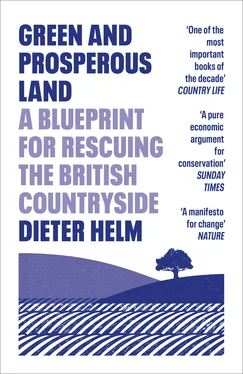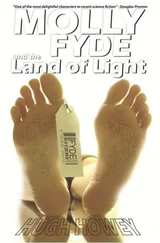By that time an enormous amount of damage had been done to the natural environment. After World War II, British agricultural policy, and then the Common Agricultural Policy (CAP), had transformed the land, polluting as it went. My grandfather’s farm was sold and turned into one large field in the 1960s, with the hedgerows literally dynamited and mole drainage applied. That put an end to the lapwings, and most of the skylarks too. ‘Progress’ had arrived.
What happened to that farm was but a microcosm of what was happening everywhere at an accelerating rate from the 1960s. Alongside the intensification of agriculture, industrial development, housing and roads bisected the landscape and left fragments of nature in between. Population growth brought with it increasing consumption, and some of this has proved highly damaging. Prosperity came, built on a fossil fuel economy, bringing with it pesticides, plastics and petrochemicals.
The consumer boom drove a wedge between nature and people, and in a highly urbanised society fewer and fewer people experienced nature and, not surprisingly, cared less and less about it, except perhaps the bits they saw on television. There were exceptions and conservation successes, but the trend was abundantly clear. My grandfather’s farm, with all its biodiversity and wonder, would now be regarded by most people as something that might appear in the fiction of H. E. Bates’s The Darling Buds of May , or a nature reserve – an ‘uneconomic’ yet quaint relic of a more primitive time.
Many environmentalists had reached a point of despair by 2011 when the coalition government published its White Paper, ‘The Natural Choice’.[2] The National Infrastructure Plan, the house-building targets, and the overwhelming emphasis on coping with the fallout from the financial crisis of 2007/08 set other priorities, with nature very low down the pecking order. A quick read of the 2011 White Paper confirms this: it is largely without content. With little to actually contribute to turning the tide on environmental damage, it took the classic Yes Minister approach: it set up a committee to think about it. This was the origin of the NCC.
Why, then, take on the chair of the NCC, apart from sentiment? Why try to work on the inside rather than protest on the outside? Or simply give up? There are several reasons. The past approaches have not worked, despite occasional Pyrrhic victories, and hence the NCC could hardly make matters worse. But the main reason was that I was optimistic that the NCC could really make a difference. For all the vacuity of the 2011 White Paper, there were two elements that could be built on: the clear aim to integrate the environment into the heart of the economy; and the overarching political commitment to leave the environment in a better state for future generations.[3]
Perhaps naively, I thought both worth taking seriously. I am an economist, not a scientist, and what interests me is the allocation of scarce resources. That is what economics is all about – making the best of what we have, and investing in the best possibilities to improve our lot. While humans have so far got by very well by pitting progress against nature, and especially in agriculture, this does not seem to me a good option going forward. The damage has gone too far, and our prosperity is likely to be compromised if we go on as we are. Put negatively, the environmental damage is going to make us all poorer. Put positively, we can be much better off if we protect and enhance our environment. It is not nature versus the economy; it is investing in nature to increase prosperity. My grandfather’s farm might not have turned out to be so ‘uneconomic’ as was easily assumed in an agricultural context riven with perverse (uneconomic) subsidies.
This is beginning to be understood on the global stage, even if little is being done to address the problems. The climate change penny has dropped, and people are beginning to understand that the mass extinction under way is unlikely to have a happy ending for us. At the local level, the challenges of mental health, of obesity, and of the loss of beauty and wonder in our lives are getting more bandwidth. Added to this broad dawning of understanding, there are lots of specific costs to the pollution we are continuing to cause. Plastics are now headline news. Water companies have reached the end of the treatment road and recognise that it is cheaper to pay farmers not to pollute. The loss of soil is leaving farmers exposed. Poor air quality carries on killing people. None of this makes much sense even on narrow economic grounds.
Perhaps even more encouraging is the recognition that nature has value in itself , and not just for the ways in which it indirectly underpins our economy. Nature is the main organised interest in this country, way beyond football and trade unions. There are literally millions of members of nature organisations. Enjoying the great outdoors is the main leisure activity, whether it be a walk in the park or along the canal or riverbank, or visiting a National Park. People like nature and they care about it. They have what E. O. Wilson called ‘biophilia’.[4] The BBC series Blue Planet II was watched by 17 million people in the UK. Gardening, that intimate engagement with plants and wildlife close up, is a national obsession. All of this great energy and enthusiasm can be harnessed to protect and enhance our natural capital.
Upon its creation as an independent advisory committee to the government, the NCC set about two main tasks: first, defining what natural capital is, identifying which bits matter most, and creating a conceptual framework around science and accounting; and second, putting the overarching generational objective into a practical and deliverable framework. Against the odds, and in the face of much scepticism from environmentalists, we did this.
The NCC has already achieved a great deal. It established natural capital as the way of thinking about our natural environment, as a hard and rigorous concept, and not simply another slogan that can mean anything to anyone according to their vested interests. Crucially, the NCC proposed a 25 Year Environment Plan, and this has now been published, with broad political support.[5] It remains to be seen whether it is fully implemented. But the signs are encouraging. Legislation is coming.
In the early years of the NCC I wrote Natural Capital: Valuing the Planet to provide an accessible account of what the concept means, how to measure it, and the broad policy implications that follow.[6] Now we have the 25 Year Environment Plan, I want to set out the prize that this could offer, and what the environment could look like mid-century. Most of all I want to show why this is in our economic interests, why it will enhance our prosperity, why we can be green and more prosperous at the same time, and why we don’t have to accept as inevitable a world without our insects, our birds, our wild flowers and fungi, and our mammals, reptiles and aquatic life. We don’t have to have the poverty of a silent spring and of monotone landscapes.
That is what this book is all about. It is deliberately broad in scope and content, providing a framework and illustrating what sort of outcomes there might be, and most importantly showing how we can not only deliver on all these individual projects, but also how they can be combined in a great national effort. Most of the examples are already well known to naturalists and ecologists. Many very good people have come up with myriad plans for their own patches. The aim here is to think big, to think about Britain as a whole, and to consider how it can be made to work better for the next generation. I make no pretence of having the scientific expertise to fill in the details – that is for others much better qualified than me. What I do lay claim to is showing how this all works economically and how to implement it.
Читать дальше











